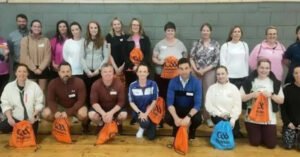More than 200 primary teachers complete Leading Gaelic Games
By Cian O’Connell
More than 200 primary teachers completed Leading Gaelic Games courses in nine centres.
Delivered in a blended format with practical and online sessions, the course aims to develop teachers’ knowledge, focusing on skills, managing and planning coaching programmes, including those that involve the participation of visiting coaches.
The course also addresses issues such as inclusion, curriculum integration and linkage within PE, and games as part of a healthy school environment.
A recent partnership with Mary Immaculate College and Munster GAA has been significant along with the work of the head of games and coach developers within the various counties that ran courses this year – Carlow, Dublin, Galway (ATU and Tuam), Laois, Limerick, Mayo, Waterford and Wexford.
Emma Byrne, GAA Learning and Development Support Officer acknowledges the role of teachers and what is being done to support them in schools. “We’d established a relationship with Richard Bowles and his team in Mary I, and teachers in schools are key in developing GAA,” she explains.
“It is about trying to support them the best way we can.
“I know there is work in our department team spearheaded by Sean Gannon, Sarah Furey to name but a few and a working group looking at a new Schools Programme called ‘Gaelic Time’, a resource that will be launched as a pilot in the coming months that will hopefully aid to help teachers developing Gaelic Games within the school environment going forward”
Participant reaction to the courses has been extremely positive. “The blended approach, the mixture between the practical and the theory works well,” Byrne explains. “The practical is two days face to face, and then you’ve the online components that teachers complete in their own time following the “Just in Time, Just for Me!” mantra of a new and evolving learning space”
“The advancements within our TOBAR system has helped. David Sweeney, our eLearning manager, has done a lot of work building and developing the system and the online modules so teachers can do it in their own time”
“Even the recent coach Baseline Report Peter Horgan led shows people are time poor. Having a blended approach to learning helps too.”
Providing assistance to teachers is crucial according to Byrne. “We’re trying to help all key stakeholders – players, coaches, and teachers,” she adds.
“We’re trying to create that environment for everyone to develop and learn at whatever rate or pace that may be.”

